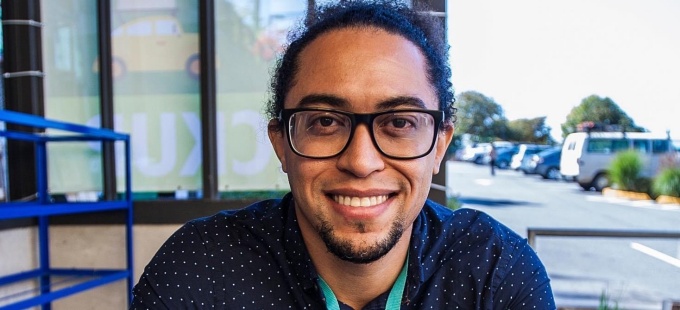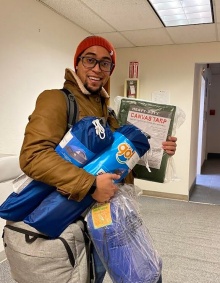UB MSW student wins prestigious NASW Foundation scholarship

By Matthew Biddle
Adam Fryer, a student in the School of Social Work’s online MSW program, has been awarded the Verne LaMarr Lyons Memorial Scholarship from the National Association of Social Workers (NASW) Foundation.
Awarded to just six master’s students nationwide each year, the scholarship recognizes students who demonstrate an interest in or experience with health or mental health practice and a commitment to working in African American communities.
“I’m still in disbelief,” he says of the award. “I will be the first generation in my family to get a master’s, so it means a lot just to be in this program. This award really validates all the work I’m doing.”
The scholarship will help Fryer continue working to achieve his dream of becoming a counselor. “I always resonated with that character in the movies — the person in the chair who always seemed to know the right things to say,” he explains.
Fryer first earned his bachelor’s degree in psychology from UB in 2011 and is now on track to complete his MSW this summer.
“The knowledge I’ve gained and the experiences I’ve had in the MSW program have changed me completely,” says Fryer, who lives in Bellingham, Washington.
He points out the program’s emphasis on cultural self-care: “Going into the master’s program, I thought about human services in the same way that an engineer might think about their work. Now, I understand it’s more flexible and realize how much of yourself you put into this work — and how important it is to take care of yourself, too.”

Fryer prepares to deliver tents, sleeping bags and supplies to clients experiencing homelessness.
During his foundation year, Fryer completed an employment-based field placement with Whatcom County’s Law Enforcement Assisted Diversion (LEAD) program, where he works as a case manager.
LEAD reimagines how a community approaches public safety. When individuals with behavioral health issues commit low-level violations, officers refer them to the program, rather than relying on arrest and incarceration. From there, case managers like Fryer can help them improve their lives by connecting them with necessary services and addressing the root of their issues.
“Our No. 1 goal is to help people get on their feet,” Fryer says. “Because of their circumstances, someone may be stealing just to eat, but we can come in and help get their benefits activated, provide transportation to appointments and find them housing.”
LEAD aims to address racial disparities in the criminal justice system, a mission that aligns with Fryer’s own passion and life experiences. In the wake of George Floyd’s murder, for example, Fryer was an activist organizer with The People’s Peaceful Protest in Geneva, N.Y.
"The racial divide in access to resources is just so bad,” he says. “Going forward in my career, I hope to have my own practice, so I can help people leap over those barriers and bring quality mental health services to people wherever they’re at.”